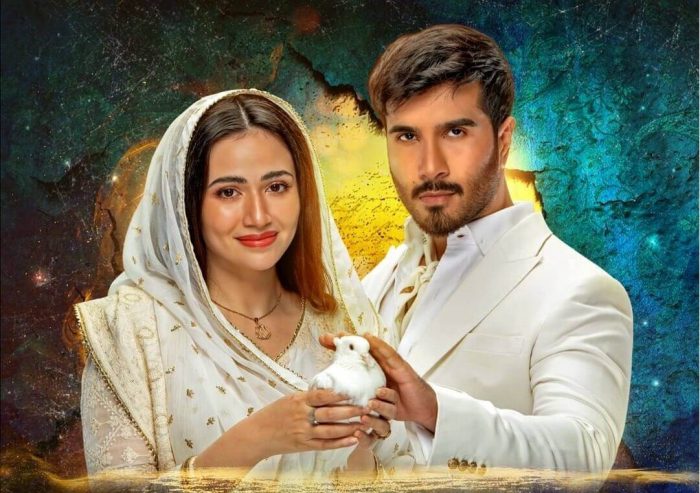“Aye Musht E Khaak” is Feroze Khan and Sana Javed’s latest success. With this hit pair in lead roles, supported by Asad Siddiqui, Shahood Alvi, Iffat Omer, Nimra Khan and others, the story has been written by Maha Malik and directed by Aehsun Talish. This is a fascinating story, a story that depicts what happens when two individuals come together in an arranged marriage and discover they are on entirely different pages in terms of religion.
What stands out the most about this episode is watching Mustajab becoming thoroughly unhinged. He has been fairly put-together and calm until now, though his anger streak has been visible, along with his self-obsession. However, with this episode, we see that he’s not entirely stable. This is a man with severe anger issues when things do not go his way. We witness an eye-opening scene that’s charged with strong performances from both Feroze Khan and Nimra Khan. Mustajab has now discovered how Shiza called Duaa and told her the truth about his faith. Mustajab becomes violent with Shiza, but Shiza does not back down. This is a toxic relationship, one where the two were on good terms as long as they were getting what they needed from the other – but now with Mustajab married and “in love” with Duaa, Shiza can see how she has been used. While Shiza is an obsessive character with little self-respect, it’s a great moment to see her call out Mustajab for using her and then discarding her for the “good” Duaa, a woman too good for him. Both actors do a great job here, though the way the scene has been cut makes it unclear what happens next. Does Shiza send Mustajab to jail for hitting her? We don’t really know anything other than the fact that Mustajab spends the night in jail, something which he shares with Shakeela.
It’s in this phone conversation with Shakeela that Mustajab really has a bipolar moment – calm one minute and then screaming to the skies the next in pure anger….only to calm down seconds later. It’s a bizarre scene, mostly because it catches the viewer off guard…..but this is exactly the point. We know as much about Mustajab as Duaa does, which appears to be very little. What we do know is that Shakeela, as kind-hearted as she may be, has a large hand in who Mustajab has become, constantly coddling him and covering up his actions. While Mustajab wants to come clean to Duaa about his religious beliefs, Shakeela forces him to hide this truth to save his marriage. But does he really have a marriage at this point? Mustajab doesn’t believe Duaa could ever leave him…..almost troublingly so, making the viewer wonder if Mustajab could be capable of murder?
Duaa (Sana Javed) makes solid movement in character progression in this episode, finally showing a backbone and the ability to make her own strong decisions. A lover of Ramadan, thoroughly devoted to God during this time, Duaa ha a hard time focusing due to her worries regarding her marriage. Dayaan (Asad Siddiqui) does his best to calm her nerves, but Duaa ultimately speaks to Shakeela in a wonderful scene. She places blame where it belongs – on Mustajab and Shakeela and questions Shakeela’s actions, wondering why she wouldn’t have told her the truth. She tells Shakeela in clear words that she’s reconsidering her marriage to Mustajab, something which worries Shakeela. Sana Javed performs well in this episode and leaves an impression as Duaa finally finds her voice to make her own decisions. Of course, credit must be given to the writers for making Duaa’s parents so progressive, their children given the liberty to make their own choices. Iffat Omer is also doing a great job as Shakeela, a character who is sweet and innocent technically, but is the true villain in a society where women raise their sons to be less than ideal human beings.
Asad Siddiqui is lovable as Dayaan, an ideal, level-headed, kind-hearted brother who will always do what’s best for his sister. The scenes between Duaa and Dayaan are really sweet. Still, Dayaan’s decision to get married to a girl he has barely ever seen just to make his family happy is mildly ridiculous and we can’t help wondering if Dayaan’s wife will be a troublemaker in future episodes. Doesn’t this show have enough villains? Can we avoid this one?
The only fear with this portrayal of Mustajab and where the story appears to be headed (eventually) is that it could send the wrong message that religion and being a good person are interconnected. Those who are “religious” by name could be less-than-kind while there are atheists who are genuinely good individuals morally. Hopefully the narrative does not try to associate the two together and project a bad message – intentionally or unintentionally. Overall, this is a strong episode in terms of characterization and performance. While “Aye Musht E Khaak” may be slightly melodramatic in treatment and over-the-top, the storyline continues to be a strong one that resonates with many.
